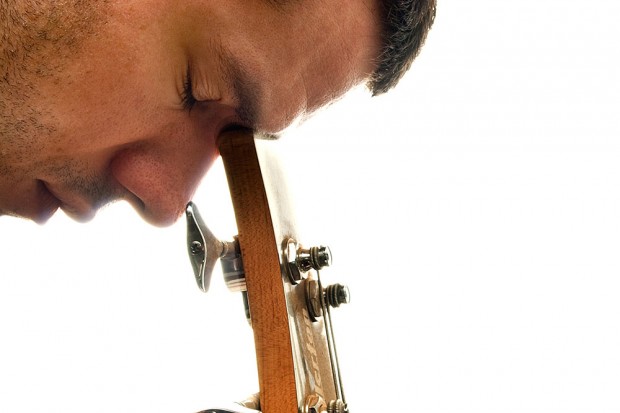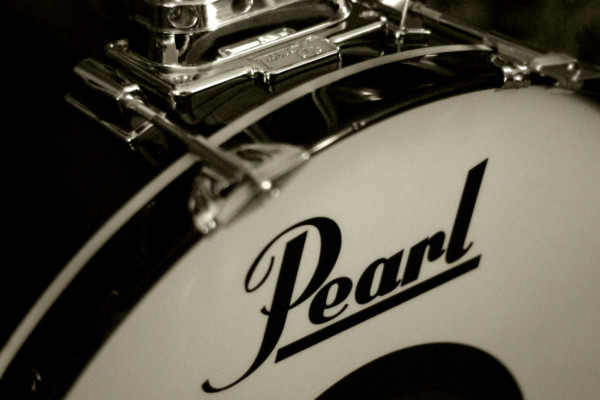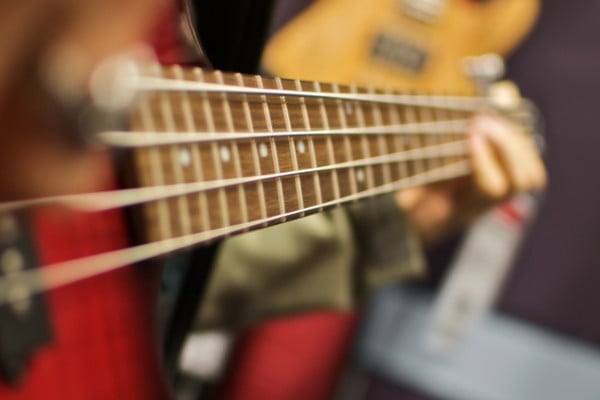Making the Decision to Go Pro as a Bassist (Or Not)

Q: What is your experience before becoming a professional musician? Is it something that naturally occurred or did you have to decide to make it a career? Could you share a story in which you reconciled any doubts you may have had?
A: Interesting question! I’ve always played music, and I always assumed that music was what I would continue to do. Day jobs were something I needed to keep from living on the streets while I tried to get good enough at playing to make money playing music.
However, there was a definitive moment when I realized I couldn’t expect to get great at playing music unless I really applied myself and practiced diligently. That realization was the moment I had to decide just how badly I wanted to go pro. I decided that I would rather practice more now and work less later. This was especially true for me because having operated under the assumption that music was what was going to happen, I only ever pursued disposable jobs. Jobs that I could quit at the drop of a hat if I got a tour, for example.
I drove moving trucks, tow trucks, ran coffee shops, worked at sub shops… you name it. As a result, I looked horrible on paper. When it came time to do or die, I also knew that I had left myself no choice but to play music.
This was actually intentional. I knew that if I ever landed a day job that made me too comfortable, I may never leave. So I actively worked labor jobs and food service gigs.
I think that moment comes for every athlete, actor, visual artist and musician – the moment when we have to decide just how badly we want it.
Making a living exclusively by playing music will likely make you poor indefinitely, and perhaps even permanently. If not poor, struggling, or only ever a few checks away from poverty. However, this has become true in the working world as well, it seems.
So, my short answer is “yes, there was very much a moment when I decided to become a professional musician.” I was already pretty good but I had hit that wall that required me to either bust my ass or decide to just be an okay player for the rest of my life. Knowing that choice #2 would leave me broke for life and unhappy with myself, I chose the harder path. I often find that the harder path is often the more rewarding path.
Any doubts? They never left. But I have less doubts now than I had before. I used to question my ability to ever get good enough to really make it. Now, that I consistently make a reasonable living, my doubts are more about whether I will ever be able to plan for the future (I don’t imagine that I’ll retire, but I would like to have some savings so I don’t have to take every gig that I can muster once I’m the old timer in town). The fact is, the old timers often get replaced by the younger generation, unless they become famous enough to always be marketable, of course. That means that I’ll likely be working less in the future, regardless of my desires.
There isn’t much in terms of retirement plans for musicians except for having paid off your house in time and at least have equity in later years. That’s a whole other topic though.
Bottom line, life is full of doubts no matter what path you take. If you choose a better and more secured job, you’ll likely wonder what would’ve happened if you had chosen music. If you choose music, you’ll always wonder if life wouldn’t just be easier if you had a steady paycheck. You really just have to weigh your heart’s desires!
Readers, how about you? Which path did you take, and how do you feel about it today? Please share in the comments.
Have a question for Damian Erskine? Send it to [email protected]. Check out Damian’s instructional books, Right Hand Drive and The Improviser’s Path.




Great column!
Nice one
It’s a struggle for sure……..but I wouldn’t want it any other way!
Two years ago, I finally gave myself permission to go for it. That means the effort is much different. I practice 2 to 6 hours a day, 4-7 days a week. I incorporate music theory. I am re-learning how to read music. Will I make a living at this? I’m full of doubt. But I heard someone say many years ago, luck is nothing more than being prepared when opportunity knocks.
I am very fortunate and I thank my lucky stars everyday I have a solid, non-music-based career that I like AND I get to perform in two bands I truly enjoy. I also get to work in musical theater every so often. I don’t make my primary living from music; but it has certainly has become a supplemental income.
I love music. I live for music. I live to write and create and perform and help others do the same and find that passion. I’m lucky I can be active in my local and regional music scene. And, my main project is doing pretty well in our region, playing our own music – which is very rewarding.
At the end of the day I’m quite happy with my professional career which provides for my family and affords me the ability to keep investing in my (seriously dedicated to) hobby – such as continuing lessons, books, records, gear, play benefits / support my community, etc…
Oddly enough, the thing I regret is not getting a music degree. I know that a degree doesn’t necessarily make the player, so, it’s just more of a personal goal. Someday…
I have been a bass player for almost 40 years now. I have graduated from the Musicians Institute in Hollywood Ca. 1987, my degree in Double Bass Performance 1997, hours toward my Masters in Jazz Studies from The University of North Texas 2010-2012 AND I went to Barber College in 1989 in case I needed something to fall back on. I am 50 years old this summer…guess what…I am going back to get my barbers license so I can still be a bass player, play gigs, teach private students and have a shot at some level of financial security over the next 15 years as a barber. I was in the Air Force Band from 1998-2002. Probably should’ve stayed in to be making a living playing bass in that capacity. Neither of my degrees are Music Education degrees for K-12 teaching, so that’s not gonna happen. Do I have any regrets? No, I do not. I have been playing the bass for money since 1981. Albeit…not ever for very much money and yes, my life has been a struggle, but my lifestyle and my level of education in music has allowed me to stay in music all these years. I have had adult students tell me years ago, I am already retired because I am doing what I love to do…play the bass. Go Pro? This to me is a broad category. How “Pro” do you want to go? How good are you? Can you move to New York City or Los Angeles, CA and compete with al the different definitions of “going Pro”? How’s your sight reading? How many tunes do you know from memory in the jazz world? Do you play upright bass? How’s your arco playing? Can you win an audition in a symphony? What about a cruise ship gig? I just came off of one of those 6 month contracts. It wasn’t bad. Paid $69 a day and paid my room and board. I played 7 days a week, 5 hours a day. My chops got real high real fast. After 3-4 months, I was ready to be off the ship. Might still take another contract from Holland America, but if I get my Barber thing going, I will stay on land.
Here’s the thing, as you get older, your aspirations will change. Your hunger level for certain areas of playing will diminish, ie. like going on the road, playing in a band on a regular basis, going to rehearsals (Yuck!). I’d rather be at home listening, transcribing Ray Brown lines than playing in the local tavern with all the amateuar drinkers getting drunk while I hash out another boring rock tune or “Pride and Joy” by Stevie Ray Vaughn! No offense, great tune, but not after playing it a thousand times. I am not trying to rain on anybody’s parade or anything. Just prepare yourself for life as a bassist AFTER you have played a million gigs, toured with whoever for a bunch of dates and studied the instrument we all love until you are too old to really be a student on a University campus! Have something you love to do incase your version of “Going Pro” does not look like you thought it would and you are about to turn 50. Good Luck!
P.S. I have a gig this weekend and I am booked with The Josh Vowell Blues Band through October 2014.
Best Regards,
Kurt
My experience is similar in some ways to Michael’s. When I was younger, I was torn between pursuing music (which has always been and always will be a very important part of my life) or engineering as a career. I ended up choosing the path of financial security and for many years I had this recurring “What if?” question / regret in the back of my head. Recently I’ve been performing a lot (with 2 different bands) and I see that the “effort to pay” ratio for musicians can be quite ridiculous until you reach a certain level of notoriety (which may never come). When I come home from a gig at 2 am and consider my take-home pay for all the gear-hauling, the set-up, tear-down, and rehearsal time I’ve put in…I’m truly glad I have a day job.
Don’t get me wrong: I have the utmost respect and admiration for those who choose to go pro and make it a full-time career…but when I look at some of my pro friends and see how much they struggle financially sometimes (despite their complete dedication and the fact that they’re absolute MONSTERS on they’re respective instruments), my past regrets are gone and I’m quite happy the way things turned out for me. Everyone is different: some guys will feel miserable with a day job (the non-disposable type), but for me personally it’s the best of both worlds: I have a well-paid job that I truly enjoy AND several times a month I get to perform in bars and make some extra coin. My day job gives me the luxury to decline a gig that’s inconvenient or that doesn’t sound fun to me, plus it allows me to get some decent gear, too.
Hi Damian,
I decided when I was 14 that bass was going to be it. A lot like you, I didn’t have a plan B, although I didn’t work any day gigs. I think that NOT having a safety net might be one of the best motivators, although it’s a scary one sometimes. -Was also going to add- I am closer to retirement than you are. I am grateful to have done tons of union gigs, so there is some kind of pension (10% on each gig) there for me, as well as a pension from my teaching work. I don’t ever plan to stop playing or teaching, but it’s nice to know that I (might?) be okay when the time comes to slow down. It’s always a dodgy career to base your life on, but in hindsight, things have kept working out somehow. (Knocking on desk!)
14 years in the trenches playing professionally was the greatest times of my life. Damian nailed it in this article. I was lucky, we made a very good living, and with planning, we didn’t starve. I paid for college and grad school thanks to music. Hard work and dedication are the key, desire the engine, and music the vehicle. Take it for a drive.
I used to play semipro, meaning I was in a 80’s metal band and we played gigs 2 – 3 times a week, but we couldn’t make a living so I gave in to pressure from friends and family to have a ” normal ” job, and I’ve been miserable ever since. I didn’t play, even puck up a bass for 25 years, but I started practicing again several months ago and oh my gosh, I never realized how much I love playing. I don’t know what will happen next, hopefully I’ll get back to playing in a band again, but I did listen to others, and still regret it. I may not have gone all the way, but I was happy. So listen to your heart and soul, if something inside of you keeps telling you don’t quit, then don’t. Happiness is much more important than money.
Great post. Two things I would say to anyone thinking about making the jump: 1) Think Beyond The Bar Scene. For a variety of reasons, it’s really not possible to make a sustainable living being a sideman in a bar band anymore. Think about private gigs, corporate work, reading gigs. Learn to play a wide variety of styles and sight read read notes and chord charts fluently. Learn to play to a click track. 2) You can’t be “just a bass player” anymore – learn how to book gigs, be a bandleader, compose for film/TV/video games, arrange music, teach, etc. Again, there is not the money in bar gigs that there was 30 years ago, and having other skills gives you control of your career, instead of always waiting for the phone to ring. This might require you to learn new skills, but it’s better than being broke and miserable while you scrounge for a $50 blues gig. Wish someone had told me this 20 years ago…
This is not a decision to “go pro” like it is for a tennis player or a baseball player. There are hundreds of the former and latter, but thousands upon thousands of musicians that can live well and beyond, or eake it out parallel with the blue collar citizen. It took me a while to realize that I was lucky in the beginning, getting a touring gig with Leftover Salmon at age 20. But we made barely more than minimum wage at that point. And the married people were apart from their families 6-9 months a year. Things got better after several years and a little more do-able, but still never easy and the prize was still distant. I quit touring after 7 years and 46 states. I don’t freelance anymore. I book the gigs I want to do with the best musicians I know and I wouldn’t trade all that touring for anything. I am treading water as I seek my next career in school as an engineer sometimes surrounded by 22-year-olds who may have never had a job and still live at home.
I have something they will never have.
We, as musicians, you, as the fledgeling musician have something that billions of people will never have. WE CAN PLAY MUSIC. Professional athletes with legendary careers and hundreds of millions wish they were musicians. Perhaps they would trade all that just to be able to PLAY, much more be able to make even a modest living.
Here’s my lecture:
SO GO FOR IT. Go to school later! Fuck it! Keep practicing and do NOT believe you are above the little gigs or being torn down by an angry bandleader. This music thing takes years to master. The rookies are very very obvious to the pros. The veterans are very very obvious to the pros. Listen. Listen. Shut the fuck up. Learn the material. Manage up. Employ shyness as a social mode among music masters. Kill them with your notes. They will talk about it.
Hey Damian! Long time, man. Hope all is well. Great post.
To me, the degree to which someone decides to “go pro” is ultimately informed by the practical demands of life and their tolerance for financial instability. I also think that being a professional musician does not necessarily mean that music is the exclusive means by which you earn money. Being able to authentically label yourself “professional” means you’ve crossed a murky threshold of skill and value; that you’re in the upper echelon of competence, and that you comport yourself according to a certain standard of ethics, behavior, and reliability. Achieving this may or may not come in the context of a day job.
The most important contributor to a sustainable professional career, beyond the obvious playing-based skills, is versatility and a broad understanding of the multitude of paths toward making money with music. If one’s skills are limited to doing gigs, the odds are slim that they’ll consistently find enough work to pay rent, eat, have fun, save for the future, etc. If, however, a bass player can teach, write, arrange, play some keyboard, generally hustle their ass off, and rise to whatever opportunity they may find, their odds improve significantly. I’m a professional, I play with professionals, and I don’t think I know one whose sole source of income is from gigs. It’s nearly impossible, at least in the long-term.
I also think that every musician is also a human, and as humans, our interests are diverse. Music is something we do. Something we love. Something we must express to feel fully alive. But music isn’t our identity. For a lot of people, music is just one of many expressions of their curiosity and passion. In fact, cultivating the other sides of ourselves, whether it’s in the context of a day job or not, is an important part of being generally satisfied and happy. And that makes us better musicians.
I was a music performance major for one semester in college. I had decided in middle school that playing the cello was what I was going to do with my life. In that one semester I talked to pros and learned the reality of what it takes to make it, how many people try and fail, and how financially unrewarding it is once you do make it. I had been convinced by the professor I was taking lessons with before and during college that I needed not to worry and that as long as a practiced 4, 5, 6, 10 hours a day that everything would work out. I was naive and believed that no matter what, things would indeed work out. A part of me resents him for telling me that but I won’t hold it against him. There’s no point. I am now getting a degree in biomedical engineering and plan to go to dental school when I graduate. I have never regretted my decision to leave music as a career; not even once. I commend those who really stick with it. It’s not for everyone and it should’t be recommended for everyone (even if they are talented enough). I certainly didn’t have the stones for it myself. It turns out I’m better at science than music anyway.
It’s a crap shoot because there are some hacks out there making bank while ripping players are washing dishes at 45 years old so they can afford to hit the jam night at the local jam night. Talent and skill are no longer a prerequisite for fame and fortune. I don’t think it really ever was. I got 30 years of playing under my belt and I am mediocre at best and I have had lot of fun doing and I look forward to playing every chance I get. Some nights it takes fishing a quater out of a urinal to show a profit for a night of gettin on stage and having a great time but that’s part of it and I’ll never quit.
As a 54 year old hearing impaired bassist who just started playing music from scratch 9 years ago, it’s probably not realistically possible for me to plan on turning pro. I’m about 4 years away from retirement at my day job and I play the occasional gig whenever I can find one. I don’t have a band that I play with on a regular basis and after retirement -as Damian pointed out- it will be harder to compete with the young up-and-coming bands/musicians for local gigs and the open bass jobs with local bands when they become available. So I can either be content with the few gigs I get to play and the occasional jam with guys in my age group or give it up and find another hobby.
My only advice when choosing a career is – “don’t choose any career based solely on the money”. If, for example, you decide to be an engineer just because the money is great at some stage you will regret and probably even resent it. Money doesn’t buy happiness.
However,if you work at something you enjoy doing and it pays you enough to live on, then you are always going to be happy.